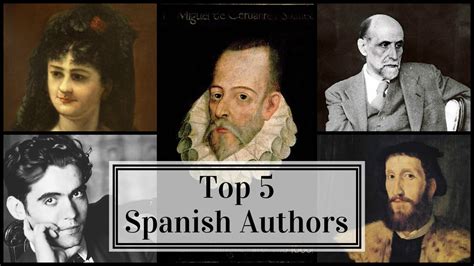Spain has a rich literary tradition that has captivated readers worldwide for centuries. From the golden age of Spanish literature to the modern era, numerous Spanish authors have left an indelible mark on the literary landscape. Here is a comprehensive guide to some of the most celebrated Spanish authors, their notable works, and their lasting impact on the literary world:

Miguel de Cervantes
Widely regarded as Spain’s greatest writer, Miguel de Cervantes is renowned for his epic novel, “Don Quixote” (1605). This masterpiece of world literature follows the misadventures of an idealistic knight-errant, Don Quixote, and his loyal sidekick, Sancho Panza. Cervantes’s vivid characters, trenchant wit, and exploration of human nature have made “Don Quixote” a timeless classic.
Federico García Lorca
Known for his lyrical and evocative poetry, Federico García Lorca was a pivotal figure in the 20th-century avant-garde movement. His most famous works include “Gypsy Ballads” (1928) and “The House of Bernarda Alba” (1936). Lorca’s tragic death during the Spanish Civil War silenced one of the most prominent voices of the era.
Pablo Neruda
Perhaps the most famous Spanish-language poet, Pablo Neruda was awarded the Nobel Prize in Literature in 1971. His evocative love poems, political activism, and surrealist imagery have made him a literary icon. Among his most celebrated works are “Twenty Love Poems and a Song of Despair” (1924) and “Ode to the Sea” (1956).
Isabel Allende
Chilean writer Isabel Allende is renowned for her magical realism novels that explore themes of love, loss, and identity. Her novels, such as “The House of the Spirits” (1982) and “Daughter of Fortune” (1999), have sold over 70 million copies worldwide, making her one of the most widely-read Spanish-language authors.
Carlos Ruiz Zafón
Contemporary Spanish novelist Carlos Ruiz Zafón is best known for his international bestseller, “The Shadow of the Wind” (2001). Set in Barcelona, the novel follows a young man’s journey to uncover a mysterious literary past. Zafón’s atmospheric storytelling and vivid characters have garnered critical acclaim and a loyal readership.
Impact on World Literature
Spanish authors have played a fundamental role in shaping the course of world literature. Their works have been translated into countless languages, reaching a global audience. They have explored universal themes of human existence, love, war, and the search for meaning.
Benefits of Reading Spanish Literature
- Expanded cultural understanding: Spanish literature offers a window into Spanish culture, history, and traditions.
- Enhanced language skills: Reading Spanish literature can improve vocabulary, grammar, and reading comprehension.
- Intellectual stimulation: Spanish authors challenge readers to think critically and engage with complex ideas.
- Emotional resonance: Spanish literature often evokes powerful emotions, connecting readers with the characters and their experiences.
- Appreciation for diversity: Spanish literature showcases a wide range of perspectives and voices, fostering a greater appreciation for diversity.
Common Mistakes to Avoid
- Assuming all Spanish authors are the same: Spanish authors come from diverse backgrounds and write in different styles.
- Limiting yourself to translations: Reading Spanish authors in their original language can provide a more authentic experience.
- Neglecting context: It is important to understand the historical and cultural context of Spanish literature to fully appreciate its significance.
- Focusing solely on popular authors: While famous Spanish authors are undoubtedly influential, there are many talented lesser-known writers worth exploring.
How to Step-by-Step Approach to Appreciating Spanish Literature
- Start with a classic: Immerse yourself in a recognized masterpiece, such as “Don Quixote” or “Gypsy Ballads.”
- Explore different genres: Branch out from novels to poetry, drama, and short stories to experience the diversity of Spanish literature.
- Read in Spanish: If possible, try to read Spanish literature in its original language for a more authentic experience.
- Engage with the culture: Visit Spain or connect with Spanish culture to gain a deeper understanding of the authors and their works.
- Join a book club or online forum: Discuss Spanish literature with others to share perspectives and expand your knowledge.
Conclusion
Famous Spanish authors have left an indelible mark on world literature with their profound insights, literary prowess, and cultural contributions. By reading their works, we gain a deeper understanding of Spain, the Spanish language, and the complexities of the human condition. Embarking on a journey through Spanish literature is an enriching experience that will captivate your imagination and broaden your literary horizons.
Tables
Table 1: Popular Works by Famous Spanish Authors
| Author | Notable Works |
|---|---|
| Miguel de Cervantes | Don Quixote |
| Federico García Lorca | Gypsy Ballads, The House of Bernarda Alba |
| Pablo Neruda | Twenty Love Poems and a Song of Despair, Ode to the Sea |
| Isabel Allende | The House of the Spirits, Daughter of Fortune |
| Carlos Ruiz Zafón | The Shadow of the Wind |
Table 2: Awards and Recognitions
| Author | Award/Recognition |
|---|---|
| Miguel de Cervantes | Golden Age of Spanish Literature |
| Federico García Lorca | Nobel Prize in Literature (posthumously) |
| Pablo Neruda | Nobel Prize in Literature |
| Isabel Allende | Presidential Medal of Freedom |
| Carlos Ruiz Zafón | International Bestseller |
Table 3: Key Literary Movements
| Author | Literary Movement |
|---|---|
| Miguel de Cervantes | Spanish Golden Age |
| Federico García Lorca | Avant-garde |
| Pablo Neruda | Surrealism |
| Isabel Allende | Magical Realism |
| Carlos Ruiz Zafón | Gothic |
Table 4: Geographical and Historical Context
| Author | Hometown | Historical Period |
|---|---|---|
| Miguel de Cervantes | Alcalá de Henares | Spanish Golden Age |
| Federico García Lorca | Granada | 20th-Century Avant-garde |
| Pablo Neruda | Parral, Chile | 20th-Century Surrealism |
| Isabel Allende | Lima, Peru | Contemporary Magical Realism |
| Carlos Ruiz Zafón | Barcelona | Contemporary Gothic |
